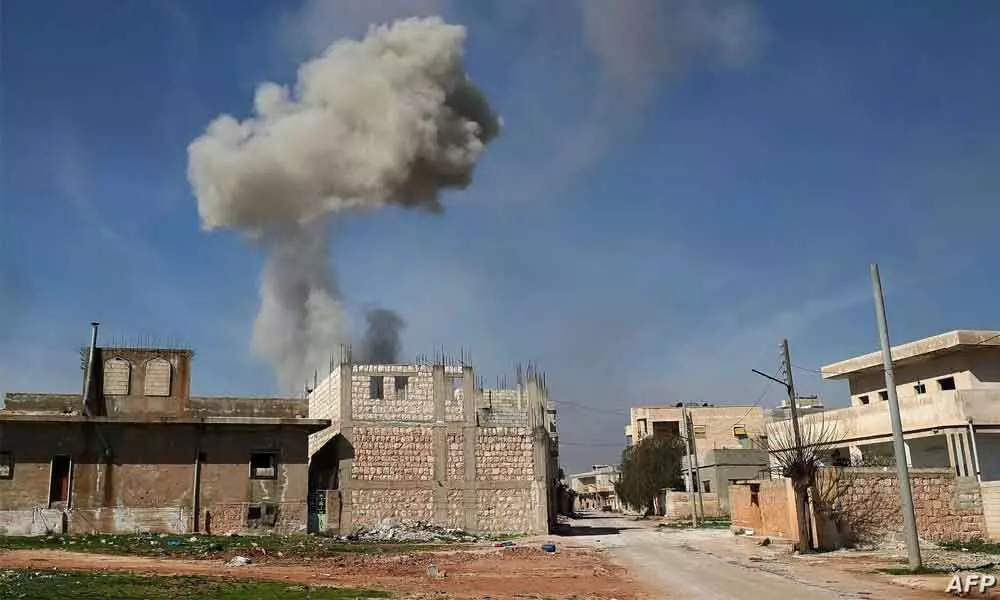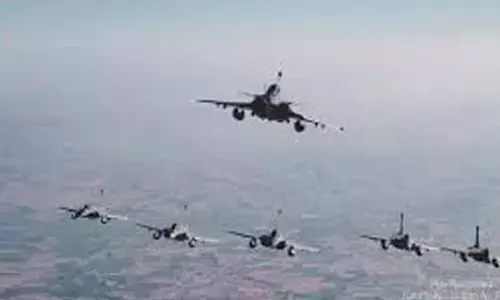Idlib likely to spell doom on Turkey

Will Turkey and Russia go to war over Idlib, finally? Perhaps, yes is the answer.
Will Turkey and Russia go to war over Idlib, finally? Perhaps, yes is the answer. It is no more about 'if' but about 'when'…
The Syrian civil war has entered its final phase now, but it has not followed the logical path to reach the conclusion the major players of the conflict sought it to be.
Turkey, Russia and Iran entered into the Sochi accord in 2018 to turn Idlib into a de-escalation zone. This zone was meant for rehabilitation of refugees too. The government forces led by Assad and supported by Russia as well as jihadi forces linked were expected to maintain restraint and not attack each other with heavy weapons. Observation posts were erected by all to oversee the arrangement.
The very agreement among the three arose out of vested interests and political compulsion but not out of love for the refugees' interest. Moreover, they wanted to kick out the US from Syria completely. That was more of a common interest.
The Sochi Agreement could not be drawn to a logical conclusion because, it soon led to a blame game in the region. Russia accused Turkey of failing to meet its obligations and also of supplying weapons to jihadists fighting the Assad government.
Recep Tayyib Erdogan, the President of Turkey, in turn accused the Russian and the Syrian government of unleashing violence against the 'innocent civilians' forcing more and more Syrians into Turkey burdening the country further.
A problem here was that neither Russia's Putin nor Turkey's Erdogan had clarity on whom to term jihadi. If Idlib has been created as a buffer zone, the jihadi forces were the real buffer for Turkey and Erdogan. (Erdogan always used Syria to hit out against his critics back home and to hold on to power by all means).
The agreement also did not specify how much of Idlib will be under the zone and who all should control it. So the rebel groups always dominated the area. While Idlib is held by an array of rebels, the most powerful among them is Hayat Tahrir al-Sham (HTS), which was formed by a large faction that split from the Syrian branch of al-Qaeda in 2017.
These groups that came out of al-Qaeda did so only to protect themselves from the accusations and allegations that it was part of the ISIS and al-Qaeda as it was unleashing similar brutalities in its war to establish an Islamist kingdom.
Erdogan entered the Syrian theatre to prevent Kurdish control in northern Syria. Turkey is afraid that any development in favour of Kurds in the northern Syria could always inspire the Kurds in the southeast regions of Turkey.
Russia is also wary of Erdogan's plan to project himself as the saviour of Islam and become the most powerful ruler with influence extending far and wide in the mid-West region. In addition, as pointed out earlier, a troubled Syria is good for Erdogan to keep his country under his tight leash.
While the distrust was allowed to thrive, Syrian government forces launched the offensive against the rebels in December last leading to the displacement of at least 9 lakh civilians. It was followed up by an attack on a Turkish observation post which led to killing of 13 Turkish soldiers.
In retaliation Turkey not only attacked and killed Syrian soldiers and also four members of the elite Russian special forces while fortifying its positions in Idlib, but also followed it with cosying up to Ukraine much to the chagrin of Russia. Erdogan went ahead and pledged 200 million dollars to strengthen Ukraine militarily.
It should not take long for Erdogan to attack Syria and Russia directly in this scenario. What will then be unfolding is fearsome. A million population living in make-shift tented accommodation and in appalling conditions will become fodder for cannon.
Idlib is the last stronghold of rebels and Assad wants to wipe it clean. He had carefully planned relocation of several rebels into Idlib zone only to corner them all easily with the Russian help.
Turkey, Russia, Iran and the Syrian governments played the game so far targeting the US presence which they did not want in Syria. The US knew that the differences among them would not be contained for long and they would enter the lean patch sooner.
Will it be possible for Russia to place Syria in the hands of Assad once for all? Can it go ahead and control its interests in Syria and the Mid-West? Would it be in a position to control Turkey through a stable Syria? The primary goals of Russia being such why will it allow Turkey to muddy the waters again?
Any country which has invested in another country during either peace time or war time would always plan to recoup its costs with interest. Russia is no different.
Erdogan is caught in a Catch-22 situation now. It is such a paradoxical situation from which he cannot escape because he wants to wield his power over the region through the jihadi forces while he has to ensure that large immigration does not destabilize his government in case of Assad's aggression.
So he has little power to exercise over the Syrian Opposition groups and parties and can only prefer a continued armed confrontation with the Assad regime.
Will he stay the course? He is known to take tough decisions. And Putin will not step down his efforts too, come what may. Russia has got involved too deep and too far in Syria. It does not make any sense for it to back down in the face of Turkey's aggression.
Erdogan will play all his cards, the NATO, EU and emotional blackmail with Syrian refugees.
All that is not going to help Turkey anyway. Idlib air space is under the control of Russia that gives it immense potential to inflict severe damage on Turkey's ground forces.
Turkey is all about its ruler's plans. Russia is all about the country's stakes. That is the fundamental difference, and this could prove to be Erdogan's nemesis sometime sooner.

















